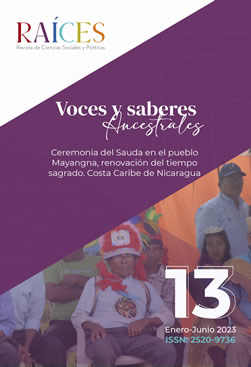Sauda ceremony in the mayangna people, renewal of sacred time.
Caribbean Coast of Nicaragua.
DOI:
https://doi.org/10.5377/raices.v7i13.16966Keywords:
Mayangna, Sauda, identity, culture, worldviewAbstract
The Mayangna culture is one of the oldest on the Nicaraguan Caribbean Coast. The Mayangna Nation integrates nine territories with a territorial extension of 8,101 km2, with an approximate population of 40,000 inhabitants who live in 75 communities. Most of the territories are located in the municipalities of Bonanza, Rosita, Siuna, Waspam, in the Autonomous Region of the North Caribbean Coast; Karawala, in the Autonomous Region of the South Caribbean Coast and San José de Bocay in the department of Jinotega. This indigenous town preserves its language, customs, traditions, beliefs, knowledge, and its own administration system. An essential ancestral ceremony to keep the Mayangna culture, identity, and worldview alive is the Sauda, an expression made up of the terms in the Mayangna language, sau: “earth” and the word “da” which comes from daniwan” god, that is, sau daniwan (the god of the earth). Through this sacred ceremony of invocation of Sauda, the Ditalayang (wise men, spiritual guides) taught about the interrelation between the human being and the spiritual beings that protect nature, which is the basis of the Mayangna worldview that is perceived through themselves as part of the macrocosm. In these days of festivity, culture is reaffirmed with the collective leadership of indigenous authorities, caciques, councils of elders, women, and youth councils. This writing explains, from the Mayangna indigenous perspective, the origins and presence of the Sauda ritual ceremony.
Downloads
References
Consemiuz, E (2004). Miskitos y Sumus de Honduras y Nicaragua. Colección cultural de Centroamérica Serie Etnología No. 2. Managua, Fundación Vida.
Von Houwald, G (2003), Mayangna. Apuntes sobre la historia de los indígenas Sumu en Centroamérica. Contribuciones a la etnología centroamericana. —(Colección Cultural de Centroamérica; Serie Etnología N’ 1). Managua, Fundación Vida.

Downloads
Published
How to Cite
Issue
Section
License
Copyright (c) 2023 Universidad Nacional Autónoma de Nicaragua. UNAN-Managua, Nicaragua.

This work is licensed under a Creative Commons Attribution-NonCommercial-ShareAlike 4.0 International License.



